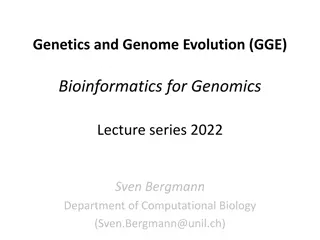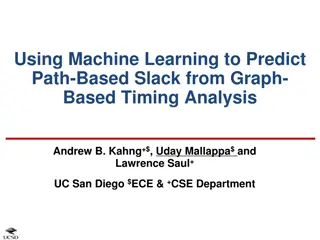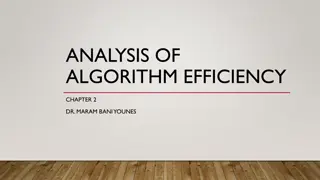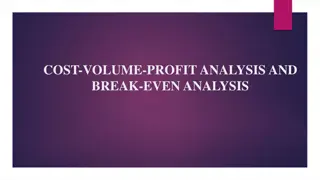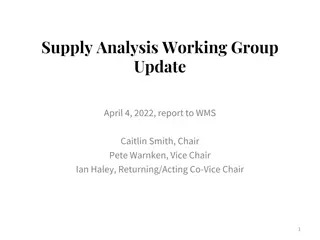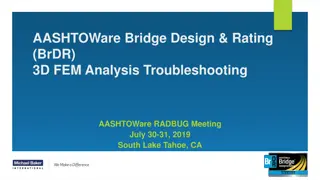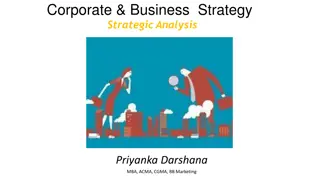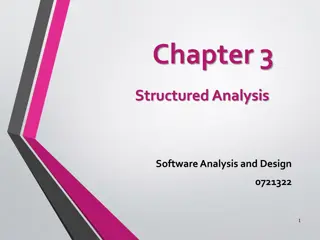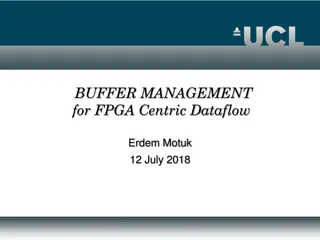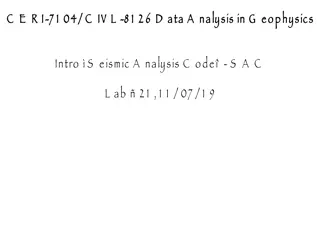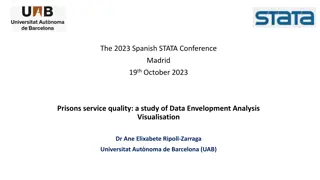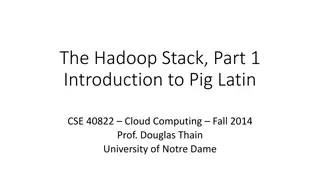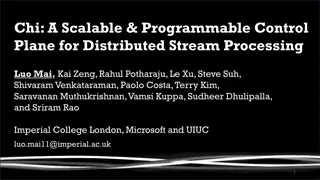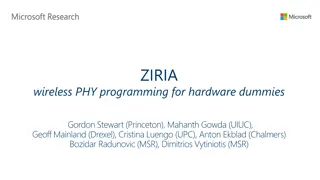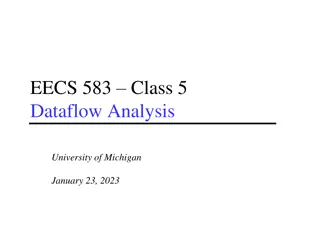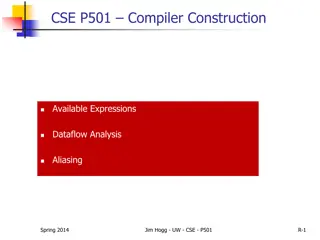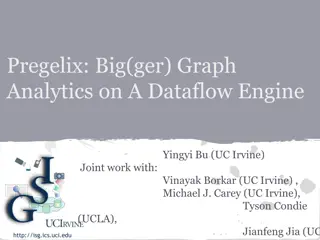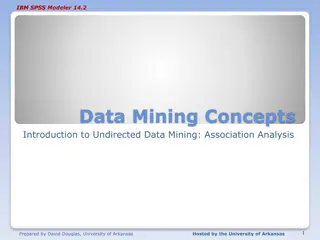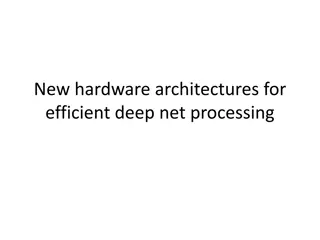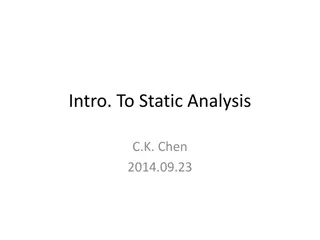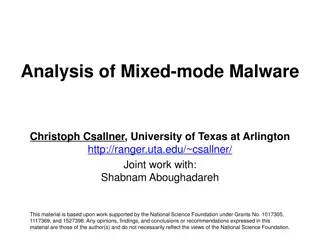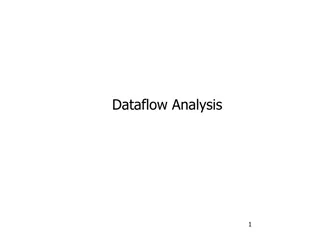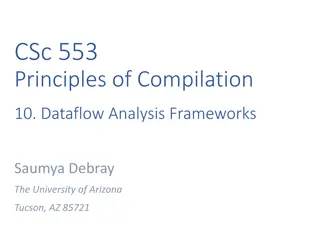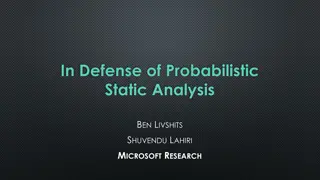Algorithm Analysis
Algorithm analysis involves evaluating the efficiency of algorithms through measures such as time and memory complexity. This analysis helps in comparing different algorithms, understanding how time scales with input size, and predicting performance as input size approaches infinity. Scaling analysi
1 views • 30 slides
Market Analysis (Project Formulation)
This detailed guide covers essential aspects of market analysis and project formulation in entrepreneurship, including feasibility analysis, techno-economic analysis, market demand analysis, steps in market analysis, and factors to consider for market demand analysis. Explore how to assess market de
2 views • 30 slides
Object-Oriented Analysis and Design Workflow
Object-Oriented Analysis (OOA) is a crucial step in software development to produce a logical model of the system's functionality. It involves requirements analysis, use case analysis, and use case realization to identify classes, responsibilities, attributes, and associations. The process includes
11 views • 90 slides
Static Analysis Techniques Overview
Explore static analysis techniques such as syntactic analysis, dataflow analysis, and model checking. Understand the concept of basic blocks in static analysis and their boundaries. Dive into the opportunities provided by static analysis in summarizing program behavior without executing it.
9 views • 27 slides
Bioinformatics for Genomics Lecture Series 2022 Overview
Delve into the Genetics and Genome Evolution (GGE) Bioinformatics for Genomics Lecture Series 2022 presented by Sven Bergmann. Explore topics like RNA-seq, differential expression analysis, clustering, gene expression data analysis, epigenetic data analysis, integrative analysis, CHIP-seq, HiC data,
0 views • 36 slides
Comprehensive Cost Management Training Objectives
This detailed training agenda outlines a comprehensive program focusing on cost management, including an overview of cost management importance, cost object definition, cost assignment, analysis, and reporting. It covers topics such as understanding cost models, cost allocations, various types of an
2 views • 41 slides
Machine Learning for Predicting Path-Based Slack in Timing Analysis
Utilizing machine learning to forecast path-based slack in graph-based timing analysis offers a solution for optimizing power and area efficiency in the design process. The Static Timing Analysis incorporates accurate path-based analysis (PBA) and fast graph-based analysis (GBA) to estimate transiti
1 views • 31 slides
Understanding Algorithm Efficiency Analysis
In this chapter, Dr. Maram Bani Younes delves into the analysis of algorithm efficiency, focusing on aspects such as order of growth, best case scenarios, and empirical analysis of time efficiency. The dimensions of generality, simplicity, time efficiency, and space efficiency are explored, with a d
1 views • 28 slides
Understanding Cost-Volume-Profit Analysis and Break-Even Analysis
Cost-Volume-Profit (CVP) analysis is a valuable technique that examines the connection between costs, volume, and profits in business operations. By determining the break-even point, setting selling prices, optimizing product mix, and enhancing profit planning, CVP analysis aids in making informed d
0 views • 29 slides
Qualitative Data Analysis Techniques in Research
The purpose of data analysis is to organize, structure, and derive meaning from research data. Qualitative analysis involves insight, creativity, and hard work. Researchers play a crucial role as instruments for data analysis, exploring and reflecting on interview discussions. Steps include transcri
1 views • 27 slides
Supply Analysis WG Update & Project Success Factor Analysis
The Supply Analysis Working Group provides updates on mid-term load forecasts using different weather models. The report highlights how weather unpredictability affects forecast accuracy. Additionally, the Planned Project Success Factor Analysis evaluates success rates and development cycle trends f
0 views • 13 slides
Troubleshooting Tips for AASHTOWare Bridge Design & Rating 3D FEM Analysis
Explore hardware recommendations, factors affecting analysis speed, and tips for successful analysis in AASHTOWare Bridge Design & Rating (BrDR) 3D FEM Analysis. Learn about non-zero moments, degrees of freedom, shell elements, live loading increments, and analysis output selections for optimal perf
0 views • 26 slides
Strategic Analysis and Business Strategy Overview
This presentation delves into corporate and business strategy, including strategic analysis, external appraisal, micro, and macro environment analysis. It explores where companies compete, strategic group mapping, market analysis, competitor perception, industry forces, and PESTEL/MACRO analysis, pr
0 views • 26 slides
Understanding Structured Analysis in Software Design
Structured analysis in software design aims to describe customer requirements, create a basis for software design, and define validatable requirements. Two main modeling philosophies, structured analysis, and object-oriented analysis are discussed. Structured Analysis Model Elements such as Data Flo
1 views • 44 slides
Analysis of Palantir Technologies and Strategies for Company Diversification
This analysis focuses on Palantir Technologies, a company offering unique software systems for efficiency and security through innovative data analysis and AI. The report discusses current issues, problem statements, market analysis, competitor analysis, and strategies for company diversification to
0 views • 23 slides
FPGA Centric Dataflow Buffer Management Overview
This overview discusses buffer management for FPGA-centric dataflow systems, including the use of DDR4 RAM, solid-state storage, FIFO structures, and trigger commands for efficient data processing and storage. It also covers the handling of compressed and uncompressed data volumes, proposed hardware
0 views • 12 slides
Understanding Actor Analysis in British Parliamentary Debates
This detailed analysis explores the concept of Actor Analysis in British Parliamentary debates, covering aspects such as preparation, in-round analysis, and weighing actor impacts. It emphasizes the importance of considering various factors including socio-economic status, minority groups, and histo
0 views • 10 slides
The Norwegian Pilot Guide: Navigational Insights and Data Visualization
Explore the Norwegian Pilot Guide for sailing directions, featuring insights from the Hydrographic Service. Dive into dataflow, place names, and chart sources to enhance your maritime knowledge and navigation skills. Find a balance between data resolution and storage needs for offline usage with det
0 views • 29 slides
Introduction to Data Analysis in Geophysics with Seismic Analysis Code - SAC Lab 2.1
Explore the world of geophysics data analysis using the SAC Lab 2.1 code. Learn about seismic analysis, Fourier transform analysis, spectral analysis, color tracing, integration, differentiation, and more. The SAC online documentation provides valuable resources for users to delve deeper into this f
0 views • 45 slides
Data Analysis and Passage Analysis Project Proposal
This project proposal by Anthony Yang focuses on developing a Java program for data analysis and passage analysis. The motivation behind the project is to gain more knowledge in computer science and statistics-related topics while utilizing technology to extract useful insights from data. The propos
0 views • 8 slides
Efficiency Methodological Approaches in Prisons Service Quality Study
Exploring efficiency methodologies in analyzing prisons service quality, this study focuses on parametric and non-parametric approaches such as Data Envelopment Analysis (DEA) and Stochastic Frontier Analysis (SFA). It delves into benchmarking techniques, productivity analysis, and the implications
0 views • 21 slides
Introduction to Pig Latin for Data Processing in Hadoop Stack
Pig Latin is a dataflow language and execution system that simplifies composing workflows of multiple Map-Reduce jobs. This system allows chaining together multiple Map-Reduce runs with compact statements akin to SQL, optimizing the order of operations for efficiency. Alongside Pig Latin, the Hadoop
0 views • 20 slides
Chi: A Scalable and Programmable Control Plane for Distributed Stream Processing
Distributed stream processing systems are increasingly crucial for various production use cases, such as real-time dashboards, machine learning, and interactive debugging. The challenges of handling large variability in production ingestion workloads and high-degree data skew in queries are addresse
1 views • 20 slides
Innovations in Wireless PHY Programming for Hardware
Programming software radios is a key aspect of wireless communication research, with recent advancements in PHY/MAC design and the use of SDR platforms like GNURadio and SORA for experimentation. Challenges include FPGA limitations and the need for hardware synthesis platforms like ZIRIA for high-le
0 views • 41 slides
Dataflow Analysis and Optimization in Compilers at University of Michigan
Explore dataflow analysis techniques and optimization methods in the context of compilers through the course EECS 583 at the University of Michigan. Learn about identifying optimization opportunities, common subexpression elimination, liveness analysis, and more to enhance program efficiency and per
0 views • 28 slides
Dataflow Analysis for Available Expressions in Compiler Construction
Utilizing dataflow analysis techniques, the concept of available expressions is discussed in the context of compiler construction. The goal is to identify common subexpressions that span basic blocks by calculating their availability at the beginning of each block. The process involves determining w
0 views • 59 slides
Understanding the Relationship Between Cost Benefit Analysis and Financial Analysis
The intersection of cost benefit analysis and financial analysis is crucial for evaluating projects, with economic analysis focusing on incremental benefits and costs while financial analysis ensures sustainability. Perspectives like those of the government, utility manager, and private lender shape
0 views • 8 slides
Analyzing Big Graphs with Pregelix Dataflow Engine
Explore how Pregelix on a dataflow engine enables efficient processing of large graphs, providing insights on its system architecture, experimental results, and related work in graph analytics. Understand Pregel semantics, programming model, APIs, and graph mutations for effective analysis of big da
0 views • 38 slides
Introduction to IBM SPSS Modeler: Association Analysis and Market Basket Analysis
Understanding Association Analysis in IBM SPSS Modeler 14.2, also known as Affinity Analysis or Market Basket Analysis. Learn about identifying patterns in data without specific targets, exploring data mining in an unsupervised manner. Discover the uses of Association Rules, including insights into
0 views • 18 slides
Exploring Efficient Hardware Architectures for Deep Neural Network Processing
Discover new hardware architectures designed for efficient deep neural network processing, including SCNN accelerators for compressed-sparse Convolutional Neural Networks. Learn about convolution operations, memory size versus access energy, dataflow decisions for reuse, and Planar Tiled-Input Stati
0 views • 23 slides
Introduction to Static Analysis in C.K. Chen's Presentation
Explore the fundamentals of static analysis in C.K. Chen's presentation, covering topics such as common tools in Linux, disassembly, reverse assembly, and tips for static analysis. Discover how static analysis can be used to analyze malware without execution and learn about the information that can
0 views • 54 slides
Understanding Transactional Analysis in Human Relationships
Transactional Analysis (TA) is a method developed by Eric Berne to analyze communication between individuals. It helps in understanding human relationships by categorizing interactions into different ego states like ID, Ego, and Super-Ego. TA provides valuable insights into personalities, aids in re
0 views • 52 slides
Comprehensive Credit Analysis Process for Risk Management
Explore the credit analysis process for effective risk management, covering aspects such as requested amounts, profitability analysis, collateral analysis, industry analysis, and both quantitative and qualitative analyses. Learn about the key parameters considered in establishing internal ratings an
0 views • 45 slides
Industrial, Microbiological & Biochemical Analysis - Course Overview by Dr. Anant B. Kanagare
Dr. Anant B. Kanagare, an Assistant Professor at Deogiri College, Aurangabad, presents a comprehensive course on Industrial, Microbiological, and Biochemical Analysis (Course Code ACH502). The course covers topics such as Industrial Analysis, Microbiological Analysis, and Biochemical Analysis. Dr. K
0 views • 16 slides
Analysis of Mixed-Mode Malware and Malware Analysis Tools
This analysis delves into mixed-mode malware, detailing its two phases and potential impact on malware analysis tools like TEMU. It explores scenarios where malware attacks analysis tools, emphasizing the challenges faced in observing and preventing malicious behavior. The study also highlights vari
0 views • 14 slides
Understanding Dataflow Analysis in Program Optimization
Dataflow analysis is crucial for optimizing programs by identifying opportunities for improvements like constant propagation and dead code elimination. This analysis involves modeling values of interest, formulating fixpoint equations, and solving them to enhance program efficiency. Concepts such as
0 views • 34 slides
Understanding Dataflow Analysis Frameworks in Compilation
Dataflow analysis plays a crucial role in compilation by computing dataflow facts within basic blocks, using transfer functions and merge operators for inter-block analysis. This process helps in achieving convergence iteratively to a fixpoint, ensuring soundness, precision, and efficiency in runtim
0 views • 53 slides
Benefits of Probabilistic Static Analysis for Improving Program Analysis
Probabilistic static analysis offers a novel approach to enhancing the accuracy and usefulness of program analysis results. By introducing probabilistic treatment in static analysis, uncertainties and imprecisions can be addressed, leading to more interpretable and actionable outcomes. This methodol
0 views • 11 slides
Understanding Fixpoint Equations in Programming Languages
Fixpoint equations play a crucial role in programming languages for solving mutually recursive problems like parsing and dataflow analysis. This content explores the concepts of fixpoint equations, assumptions for ensuring solutions, computing solutions, and generalizations for cases with greatest e
0 views • 31 slides
Understanding Latent Variable Modeling in Statistical Analysis
Latent Variable Modeling, including Factor Analysis and Path Analysis, plays a crucial role in statistical analysis to uncover hidden relationships and causal effects among observed variables. This method involves exploring covariances, partitioning variances, and estimating causal versus non-causal
0 views • 59 slides




